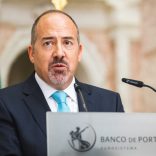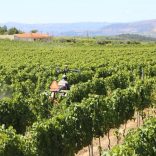Portugal's central bank governor proposes regular meetings with CPLP counterparts
CPLP: Portuguese-speaking public figures to join ‘Citizenship of Language’ project

Dozens of Portuguese-speaking public figures have joined the ‘Citizenship of the Language’ project, an initiative started by the Portugal-Brazil 200 Years Association, which marks the anniversary of Brazil’s declaration of independence from Portugal, and are on Friday to disclose their participation in it, the chairman of the board of the entity said on Thursday.
On 5 May World Portuguese Language Day is celebrated and “to mark this very important date for Portuguese-speaking countries, the Portugal-Brazil Association, together with its partners, proposes a reflection on the subject,” the chairman, José Manuel Diogo, told Lusa. “For this, several leading figures who have the Portuguese language as a common denominator were invited to record a video in which they share their own vision of Citizenship of the Language. In fact, the video should begin with the phrase ‘For me, Language Citizenship is…'”
“Para os mais de 260 milhões de falantes nos países da CPLP e nas suas diásporas, a língua portuguesa continua a ser uma língua de mobilização em favor de uma renovada urgência na implementação dos ODSs.”@antonioguterres para marcar este 5 de maio #DiaMundialdaLínguaPortuguesa! pic.twitter.com/k5OnOcxitV
— Nações Unidas (@NacoesUnidas) May 5, 2023
These short videos are to be presented on Friday, at Flipoços, the International Literary Festival in Poços de Caldas, in the Brazilian state of Minas Gerais, as part of the event’s official programme and “as part of a permanent installation on language citizenship that will have its premiere in Coimbra” on 23 June, at the Portuguese city’s Book Fair, in the cycle Citizenship of Language, he explained.
Among the public figures who have already joined the project, Diogo highlighted Mia Couto, the winner of the 2013 Camões Prize – the principal official prize for literature in Portuguese – as well as diplomats, ministers, writers, actors and cultural producers.
According to Diogo, the Portuguese language “is citizenship” in itself, not least because of recent legislative reforms in countries in the Community of Portuguese-Language Countries (CPLP).
“It is probably the only language that until today, in this time of global connectivity, one of the countries has created a law that makes it possible for speakers of that language to live in another country,” he added, in a reference to the mobility agreement reached by CPLP members last year, and already being implemented in several.
“The CPLP mobility agreement, by guaranteeing practically automatic residence permits in Portugal to citizens of Portuguese-speaking countries, is a revolutionary instrument because it is based on belonging to a common language rather than a geography,” Diogo argued. “This dematerialisation of citizenship is an innovation of civilisation.
“This shows that language is more alive than ever, it is more important than ever.”
The Citizenship of Language project continues on 12 October in a partnership under agreements signed in 2022 by Brazil’s Federal Senate and Coimbra city council, with the inauguration of the Language Citizenship House, whose mission will be to “study, think, research the new neighbourhoods, the peripheries that come to the centre, new cultural acts, new ways of understanding the world.”
The project is coordinated by Samantha Buglione, a Brazilian writer, and co-curated by another Brazilian writer, André Augustus Dias, and the Portuguese cultural producers Carlos Moura Carvalho and Diogo himself.












Leave a Reply
Be the First to Comment!
You must be logged in to post a comment.
You must be logged in to post a comment.